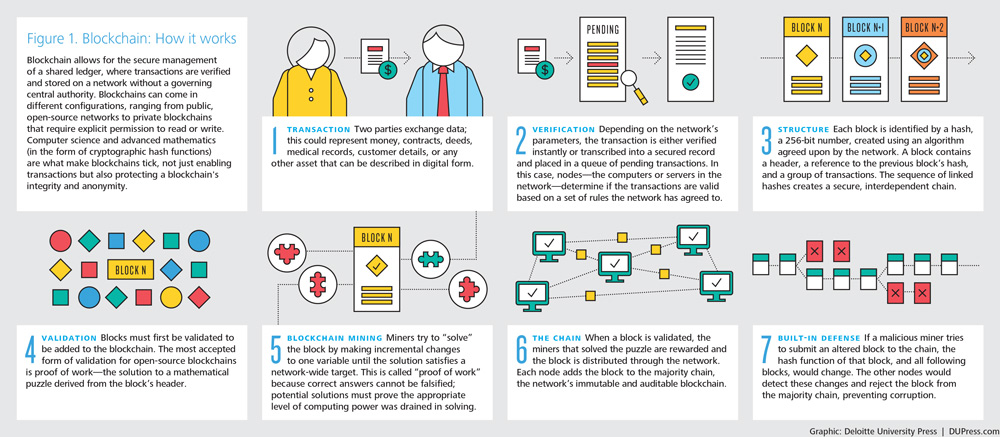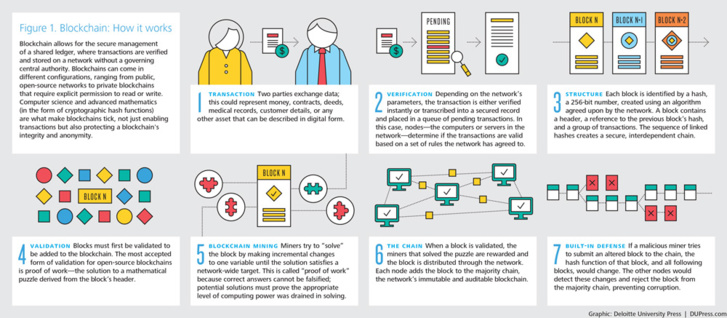Trust is a foundational element of business. Yet maintaining it—particularly throughout a global economy that is becoming increasingly digital—is expensive, time-consuming, and, in many cases, inefficient.
Some organizations are exploring how blockchain, the backbone behind bitcoin, might provide a viable alternative to the current procedural, organizational, and technological infrastructure required to create institutionalized trust.
Though these exploratory efforts are still nascent, the payoff could be profound. Like the Internet reinvented communication, blockchain may similarly disrupt transactions, contracts, and trust —the underpinnings of business, government, and society.
Some organizations are exploring how blockchain, the backbone behind bitcoin, might provide a viable alternative to the current procedural, organizational, and technological infrastructure required to create institutionalized trust.
Though these exploratory efforts are still nascent, the payoff could be profound. Like the Internet reinvented communication, blockchain may similarly disrupt transactions, contracts, and trust —the underpinnings of business, government, and society.
Discussions of blockchain often begin with bitcoin, the cryptocurrency that gained notoriety as much for its novelty as for the volatility of its valuation. In a fog of media reports driven by bitcoin’s associations with dubious use cases,1 the far-reaching potential of blockchain—the technology underpinning bitcoin—remained largely obscured. Yet, that is changing. Organizations throughout the public and private sectors have begun exploring ways that blockchain might profoundly transform some of their most basic operations, from the way they execute contracts and carry out transactions to the ways they engage customers and more.
What is blockchain? Simply put, it is a distributed ledger that provides a way for information to be recorded and shared by a community. In this community, each member maintains his or her own copy of the information and all members must validate any updates collectively. The information could represent transactions, contracts, assets, identities, or practically anything else that can be described in digital form. Entries are permanent, transparent, and searchable, which makes it possible for community members to view transaction histories in their entirety. Each update is a new “block” added to the end of the “chain.” A protocol manages how new edits or entries are initiated, validated, recorded, and distributed. With blockchain, cryptology replaces third-party intermediaries as the keeper of trust, with all blockchain participants running complex algorithms to certify the integrity of the whole.
More:
http://dupress.com/articles/blockchain-applications-and-trust-in-a-global-economy/
What is blockchain? Simply put, it is a distributed ledger that provides a way for information to be recorded and shared by a community. In this community, each member maintains his or her own copy of the information and all members must validate any updates collectively. The information could represent transactions, contracts, assets, identities, or practically anything else that can be described in digital form. Entries are permanent, transparent, and searchable, which makes it possible for community members to view transaction histories in their entirety. Each update is a new “block” added to the end of the “chain.” A protocol manages how new edits or entries are initiated, validated, recorded, and distributed. With blockchain, cryptology replaces third-party intermediaries as the keeper of trust, with all blockchain participants running complex algorithms to certify the integrity of the whole.
More:
http://dupress.com/articles/blockchain-applications-and-trust-in-a-global-economy/
Pour lire tous les articles Finyear dédiés Blockchain rendez-vous sur www.finyear.com/search/Blockchain/
Participez aux conférences Blockchain éditées par Finyear :
www.blockchain.vision
www.assurchain.com
Participez aux conférences Blockchain éditées par Finyear :
www.blockchain.vision
www.assurchain.com
Les médias du groupe Finyear
Lisez gratuitement :
Le quotidien Finyear :
- Finyear Quotidien
La newsletter quotidienne :
- Finyear Newsletter
Recevez chaque matin par mail la newsletter Finyear, une sélection quotidienne des meilleures infos et expertises de la finance d’entreprise et de la finance d'affaires.
Les 6 lettres mensuelles digitales :
- Le Directeur Financier
- Le Trésorier
- Le Credit Manager
- The FinTecher
- The Blockchainer
- Le Capital Investisseur
Le magazine trimestriel digital :
- Finyear Magazine
Un seul formulaire d'abonnement pour recevoir un avis de publication pour une ou plusieurs lettres
Le quotidien Finyear :
- Finyear Quotidien
La newsletter quotidienne :
- Finyear Newsletter
Recevez chaque matin par mail la newsletter Finyear, une sélection quotidienne des meilleures infos et expertises de la finance d’entreprise et de la finance d'affaires.
Les 6 lettres mensuelles digitales :
- Le Directeur Financier
- Le Trésorier
- Le Credit Manager
- The FinTecher
- The Blockchainer
- Le Capital Investisseur
Le magazine trimestriel digital :
- Finyear Magazine
Un seul formulaire d'abonnement pour recevoir un avis de publication pour une ou plusieurs lettres
Autres articles
-
Chainalysis acquiert Hexagate, fournisseur de solutions de sécurité WEB3
-
Ripple a lancé son stablecoin, RLUSD
-
Coinbase & Chainlink, l'union autour du projet Diamond pour renforcer l'interopérabilité entre blockchains
-
Bitstack : 5 millions d'euros levés pour construire la "neobanque Bitcoin"
-
Société Générale : une première opération de REPO sur Blockchain publique avec La Banque de France






